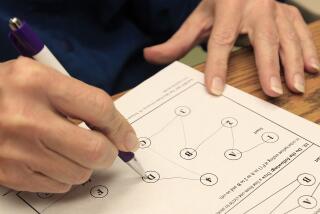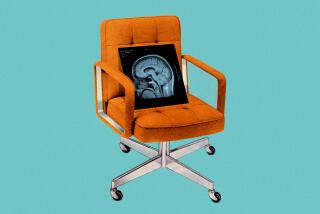Bosses Ask: How Honest Are You?
The interview went well but before Alfonso Morris got his clerkâs job at a Stop âN Go store in Dallas, he had to spend an hour taking a test aimed at determining whether he was a liar, thief or substance abuser.
It wasnât the first time. In the past two years, Morris, 26, has been asked by three prospective employers to submit to a paper-and-pencil grilling about whether heâd used drugs or stolen any money or merchandise.
His experience reflects a nationwide quest to create a drug-free, theft-free workplace; this has increased employer use of honesty and integrity tests designed to identify potential problem workers.
âI Know Iâm a Good Personâ
âThey told me they give the survey to everyone before they hire them, basically to screen you,â Morris said of Stop âN Go, which hired him in March. âI didnât think too much about it--I know Iâm a good person and should screen well.â
But critics complain the tests amount to a written version of a lie-detector or polygraph exam, violate privacy, are unscientific and encourage lazy hiring practices. Some contend the tests can be designed to detect political beliefs or union sympathies.
Others fear honest applicants mistakenly will be denied jobs, though test creators warn against using their questions as the sole determinant of employment, because the tests arenât foolproof.
Many businesses have reason to suspect workers. Government and private estimates suggest that substance abuse costs about $177 billion a year in absenteeism, decreased productivity, lower-quality work and increased benefit costs; employee theft accounts for estimated losses of $40 billion a year.
Honesty tests range in cost from $6 to $15 each, including an evaluation of results by their suppliers. For identifying drug abusers, they are becoming an attractive alternative to urine tests, which can cost up to $50 each, are often considered unreliable and face growing legal challenges.
A law in effect since December that bars most private employers from administering polygraph tests, also gave written honesty tests a boost, said Loren Siegel, an attorney for the American Civil Liberties Union in New York.
The first honesty or integrity tests were developed in the 1960s by a company now called Reid Psychological Systems; their use has multiplied recently. In 1986, an estimated 2.3 million such tests were administered; the number is expected to jump to 5.5 million by next year.
Straightforward Questions
The tests are surprisingly straightforward. They might ask if the applicant ever has stolen anything from an employer, or how many times in the past month the applicant has used drugs.
William Rognas, a Kentucky Fried Chicken franchisee with five stores in Illinois, has for two years required applicants to take an honesty test. He said his food costs have dropped 4% because employees arenât stealing; his labor costs are down the same amount as efficiency improved.
The nationwide crusade against drugs is considered a major catalyst, pushing employers into the frontier of employee privacy. âA lot of this stuff would not be possible were it not for . . . the drug scare that exists,â Siegel said. âPeople are willing to sacrifice some very fundamental rightsâ of privacy.
With the federal government conceding the drug problemâs magnitude, some experts say a âpolicing functionâ has been shifted to business. Siegel said employee testing represents âthe privatization of law enforcement.â
Who would admit to drug abuse or theft? Gregory Lousig-Nont, whose Las Vegas-based company develops and markets honesty tests, said he continually is surprised at how forthright applicants are.
Surprising Admissions
Of 10,723 people applying for work at a national convenience store chain and taking his test last year, 777 admitted having shoplifted a total of $26,190 in merchandise; 902 said they think about shoplifting; and 290 admitted having stolen $67,579 in merchandise from previous jobs. Of 10,440 people tested, 1,142 admitted to over-drinking; 739 said they used cocaine; and 37 said they sold amphetamines.
Questions are designed to prevent a person who used marijuana once five years ago from being lumped into the same âriskâ category as one who sold cocaine last week, he said.
Experts say some people confess outright because it describes behavior that has become normal for them. Others are likely to be tripped up by questions that probe attitudes toward stealing and taking drugs.
Prospective employees have no recourse but to submit to testing, even though experts say court challenges to the tests are inevitable. âIf you donât take it, they wonât hire you, and thereâs nothing you can do about it. Thatâs the bottom line,â said Siegel of the ACLU.
The vast majority of subjects donât object to the tests, according to Reid Psychological statistics.
âTheyâre user-friendly, uncomplicated and non-stressful,â said Robert McCrie, an assistant professor at John Jay College of Criminal Justice in New York. âOften people are told itâs just part of the screening process. Theyâre very revealing--an individual that could never ask about integrity in a face-to-face interview gets (information) from people who quite willingly provide it.â
Coming Under Scrutiny
Nonetheless, the tests are coming under scrutiny. Last October, the House Education and Labor Committee requested a study on the testsâ validity and the ethical implications of their widespread use. Results of the study by the Office of Technology Assessment are expected this summer.
But committee member Rep. Pat Williams, D-Mont., said the tests are epitomized by a country-Western song that goes, âIf you hang âem all, you get the guilty.â Businesses, particularly small ones, he said, âappear to find it easier to throw a very wide net than to specifically try to do legitimate and appropriate personnel screening.â
The American Psychological Assn. is studying if the tests meet research standards, since virtually all studies of them have been conducted by their sellers.
âThe publishers say the tests are valid 80% of the time . . . there seems to be some skepticism, but basically the juryâs still out,â said Wayne Camara, the groupâs director of scientific affairs.
More to Read
Inside the business of entertainment
The Wide Shot brings you news, analysis and insights on everything from streaming wars to production â and what it all means for the future.
You may occasionally receive promotional content from the Los Angeles Times.










